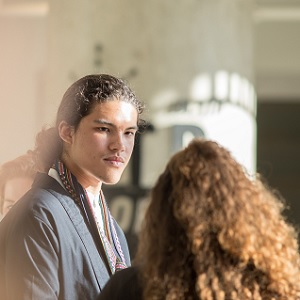
Making the link between climate-friendly food
Sept. 6, 2019 – Should we add carbon pricing to our campus food so people become aware of emissions related to their food sources? That was one bold idea proposed by LFS 450 students.
Senior undergraduate UBC students can take LFS 450, offered by the Faculty of Land and Food Systems, to advance the university’s food sustainability activities and food system. It’s a hands-on approach to making the Vancouver campus a role model in sustainability.
As a cap to the core series of community courses, LFS 450 (Land, Food, and Community III: Leadership in Campus Food System Sustainability) welcomes students from across campus to collaborate and bring their knowledge, differing skill sets and passions to enact change.
UBC operational departments propose food sustainability projects, and student teams select which ones they wish to tackle over the term. The student team that participated in the project Climate-Friendly Food at UBC: Best Practices and Policy Recommendations presented their ideas to the campus community. The project was proposed by a collaboration of three UBC departments and student groups: Climate Hub, Sustainability Collective and Campus + Community Planning.
View the video on Climate-Friendly Food at UBC.
youtu.be/r-M5FuI_oMI
This was just one of eight projects in the 2018-2019 academic year, which saw 33 students participating. Projects ranged from community engagement work with the University Neighbourhoods Association (UNA) on the topic of biodiversity and food, to achieving zero-waste catering with UBC’s Scholar’s Catering, to finding ways to make UBC food sourcing more climate friendly.
Since it launched in 2001, LFS 450 has supported the sustainability of the campus food system with new ideas proposed by 1,900 students together with campus food representatives and faculty members. The course was initiated by the Faculty of Land and Food Systems and the UBC SEEDS Sustainability Program, which creates applied research and interdisciplinary partnerships between students, faculty, staff and community partners that advance sustainability ideas, policies and practices while addressing critical societal issues.